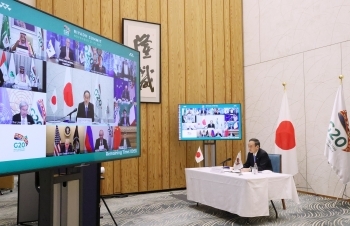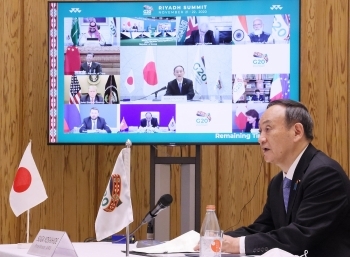G20 (Summit on Financial Markets and the World Economy)
The G20 Riyadh Summit
November 23, 2020
 G20 Ryad Summit (Day 1)
G20 Ryad Summit (Day 1)(Photo: Cabinet Public Relations Office)
 G20 Ryad Summit (Day 2)
G20 Ryad Summit (Day 2)(Photo: Cabinet Public Relations Office)
On November 21 and 22, Prime Minister SUGA Yoshihide attended the G20 Riyadh Summit. The overview of the meeting is as follows.
- During the Summit meeting, the G20 leaders discussed major issues for the international community including the global response to COVID-19, global economic recovery and inclusive recovery. The G20 leaders agreed Riyadh Leaders’ Declaration (PDF)
 released after the meeting, Prime Minister Suga led the discussion by presenting Japan’s views for a post-COVID-19 international order.
released after the meeting, Prime Minister Suga led the discussion by presenting Japan’s views for a post-COVID-19 international order. - Prime Minister Suga emphasized that the G20 should deliver the clear message that the members commit themselves to lead the world by (1) responding to COVID-19, (2) achieving global economic recovery, (3) resuming cross-border travel, and (4) shaping post-COVID-19 international order.
- With regard to G20’s response to COVID-19, Prime Minister Suga underscored the need to take a holistic approach for securing access to therapeutics, vaccines and diagnoses. In this respect, Prime Minister Suga stated that the concept of patent pool, to which Japan attaches importance, deserved to be supported by the G20. Prime Minister Suga described Japan’s active role in promoting multilateral cooperation through becoming an original member to launch of the ACT Accelerator and supporting the COVAX facility. The Prime Minister also emphasized that quality, inclusive and resilient health systems are important to prepare for any future health crisis and that, in this regard, sustainable financing for health and Universal Health Coverage (UHC) are indispensable. Prime Minister Suga announced that Japan will lead the international efforts including hosting the Tokyo Nutrition for Growth Summit in December 2021 in order to further contribute to generating an enabling environment for health security across broad sectors such as water and sanitation. The Prime Minister stressed that, in order to tackle the COVID-19 pandemic, it is important to uphold the principle of human security and to aim at achieving the goal of “leaving no one’s health behind” as well as UHC. The Prime Minister explained that Japan has been providing assistance of over 1.54 billion USD at an unprecedented speed in addressing the current crisis.
- On global economy, Prime Minister Suga stated that Japan will spare no effort to prevent infection while resuming economy and cross-border travel. As the pandemic revealed the need to accelerate digitalization, Prime Minister Suga explained Japan’s plan to establish an agency in charge of digital transformation as well as its continued effort to promote international rule-making through Osaka Track, based on the concept of Data Free Flow with Trust (DFFT). In addition, the Prime Minister pointed out the need to maintain and enhance multilateral trading system through achieving WTO reform and undertaking other efforts despite the possible spread of inward-looking tendency around the world. The Prime Minister stressed that spreading and implementing the “G20 Principles for Quality Infrastructure Investment,” promoting the reinforcement of supply chains, and addressing debt issues in developing countries in accordance with the common framework agreed by the G20 members are all conducive to realizing a better recovery worldwide.
- Prime Minister Suga reiterated his determination to reduce greenhouse gas emissions to net-zero, that is, to realize carbon-neutral by 2050. Addressing climate change is no longer a constraint on economic growth, the Prime Minister pointed out, and stressed that we need to embrace a paradigm shift that proactive climate change measures bring growth, as well as to realize a virtuous cycle of economic growth and environment protection through revolutionary innovations. In addition, the Prime Minister explained that Japan aims to reduce additional pollution caused by marine plastic litter to zero by 2050 (in line with "Osaka Blue Ocean Vision") and supports developing countries in this regard. The Prime Minister also emphasized that the G20 should increase cooperation among its members more than ever to achieve the UN Sustainable Development Goals based on the idea of “leaving no one behind”. The Prime Minister welcomed the commencement of the Private Sector Alliance for the Empowerment and Progression of Women’s Economic Representation (EMPOWER) for women’s advancement in leadership positions.
- Prime Minister Suga reaffirmed Japan’s determination to host the Tokyo Olympic and Paralympic Games as a symbol of humanity’s resilience and global unity in overcoming the COVID-19. Other G20 leaders commended the Prime Minister’s resolution.
- Prior to the Session 2 on November 22, Prime Minister Suga participated in the G20 leaders’ side event “Safeguarding the Planet: The Circular Carbon Economy Approach” through a video message. The Prime Minister highlighted that Japan will strive to realize a greener society through progressive innovation, including achieving a decarbonized society by 2050, and lead the international community. Prime Minister Suga supported the vision of “Circular Carbon Economy (CCE)” proposed by Saudi Arabia, and emphasized Japan’s contributions to international efforts on environmental issues including conserving marine resources as well as addressing the marine plastic litter.
(Reference)
G20 members, invited countries, and international organizations
(G20 members)
Saudi Arabia (Presidency), Japan, Argentina, Australia, Brazil, Canada, China, France, Germany, India, Indonesia, Italy, Mexico, Republic of Korea, Russia, Republic of South Africa, Turkey, United Kingdom, United States of America, European Union
(Invited countries)
Spain, Jordan, Singapore, Switzerland, Viet Nam (ASEAN President), the United Arab Emirates (Cooperation Council for the Arab States of the Gulf (GCC) Supreme Council President ), Rwanda (New Partnership for Africa’s Development (NEPAD President)
(International organizations)
United Nations, World Bank, International Monetary Fund (IMF), World Health Organization (WHO), World Trade Organization (WTO), United Nations Food and Agriculture Organization (FAO), Financial Stability Board (FSB), International Labour Organization (ILO), Organization for Economic Co-operation and Development (OECD), Arab Monetary Fund (AMF), Islamic Development Bank (IsDB)

